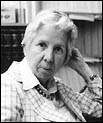![]()
![]()
![]()
![]()
![]()
![]()
Events Honor
Trailblazing Anthropologist Elizabeth Colson
Posted March 10, 1999
|
|
|
Colson, a pioneer in the study of forced migration and resettlement, is currently working on a 40-year study of the Tonga people of Gwembe Valley, Zambia, who were evicted from their territory in 1958 to make way for Kariba Lake, one the world's largest man-made lakes.
Regarded by many as the best Africanist in the United States, Colson found it difficult to break into the male-dominated world of anthropology back in the early 1940s. At Radcliffe, she and other female students were forced to sit in the hallway during lectures, unable to ask questions, while their male counterparts sat in the classroom. Despite these obstacles, Colson went on to achieve great success both in the field and in the lecture hall.
During her 20 years at Berkeley (she retired in 1984), Colson helped train some of this generation's brightest anthropologists, including Bennett Siamwiza of the University of Zambia.
Siamwiza will participate in the March 15 symposium, "Ethnography and History in a Globalizing World," along with Jane Guyer and Angelique Haugerud, beginning at 1 p.m.
On March 16 at 4 p.m. he will present the lecture, "A History of Hunger and Famine in the Gwembe Valley, 1870-1996." Both events take place in 223 Moses Hall.
For information, call 642-8338.
![]()
![]()
March 10 - 16, 1999
(Volume 27, Number 26)
Copyright 1999, The Regents of the University of
California.
Produced and maintained by the Office
of Public Affairs
at UC
Berkeley.
Comments? E-mail berkeleyan@pa.urel.berkeley.edu.
